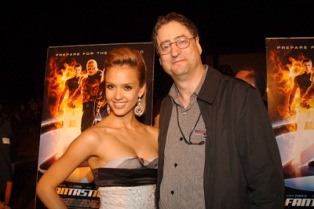I would never push a seventy-two-year-old woman down a flight of stairs without provocation.
Marvel Prez Sez "No More Auteurs!"
 During yesterday’s Iron Man set visit (I am embargoed, so please stow all questions), Kevin Feige, president of production for Marvel Studios, was surprisingly candid when it came to the subject of the company’s Hulk re-boot.
During yesterday’s Iron Man set visit (I am embargoed, so please stow all questions), Kevin Feige, president of production for Marvel Studios, was surprisingly candid when it came to the subject of the company’s Hulk re-boot.
"[The Incredible Hulk] will be different from the first one because this one will be good."
The reaction from the gathered geek press was generally enthusiastic, but a few of us registered our disapproval. What with the hidden-from-critics Fantastic Four and the Silver Surfer opening on Friday (and the far-from-loved Spider-Man 3 still holding down 2,000 screens), I found the cavalier attitude towards the accepted awfulness of Ang Lee’s original Hulk very troubling, and not just because I happen to really like the film. Listening to Feige discuss the influence his company will now be able to exert over the forthcoming adaptations of their myriad properties, this implied hostility to individual interpretation struck me as incredibly wrongheaded. Granted, Marvel needs to be fiercely protective of their signature characters; their goal is to establish and expand the brand through these films, and it’ll be impossible to do this they were to hire, say, Jim Jarmusch to apply his deadpan aesthetic to Captain America (featuring Tom Waits as The Red Skull). But that’s a straw man, and I’m not foolish enough to argue for such a thing (even though my soul craves it); I just think the company might be better off going after talented filmmakers with a point of view rather than looking to shallow stylists.
Let’s look at the Marvel track record to date (from 1998 to 2007):
Blade (d. Stephen Norrington)
X-Men (d. Bryan Singer)
Blade II (d. Guillermo Del Toro)
Spider-Man (d. Sam Raimi)
Daredevil (d. Mark Steven Johnson)
X2 (d. Singer)
Hulk (d. Ang Lee)
The Punisher (d. Jonathan Hensleigh)
Spider-Man 2 (d. Raimi)
Blade: Trinity (d. David Goyer)
Elektra (d. Rob Bowman)
Man-Thing (d. Brett Leonard)
Fantastic Four (d. Tim Story)
X-Men: The Last Stand (d. Brett Ratner)
Ghost Rider (d. Mark Steven Johnson)
Spider-Men 3 (d. Raimi)
That’s sixteen films and twelve different directors. Of those, I’d only classify Singer, Raimi, Del Toro and Lee as auteurs. As for the others, I consider Norrington the most gifted, Bowman and Ratner competent, and the rest negligible to varying degrees. In terms of quality and box office, the auteur-directed movies are not only the best, but also the most successful (albeit in terms of gross, not profit, but determining the latter requires greater scrutiny than and access not commonly granted to outside analysts). Meanwhile, those titles overseen by for-hire helmers tend to be franchise killers (though Fox was getting out of the X-Men business regardless of how well Ratner’s installment did – i.e. provided it didn’t break $300 million).
Now, let’s look at the names either attached to or rumored for the next wave of Marvel films: Louis Leterrier (The Incredible Hulk), Lexi Alexander (The Punisher 2), David Goyer (Magneto), Edgar Wright (Ant-Man), Jon Favreau (Iron Man) and D.J. Caruso/Len Wiseman (Wolverine). Of these, only Wright qualifies as an auteur of note, while Favreau has proven to be a more-than-capable filmmaker (he also talks a good geek game and attracts top-flight talent). The rest inspire very little enthusiasm.
Being a huge fan of the Hulk, I’m most concerned with a Luc Besson protégé drowning a fascinating character in pointless mayhem – especially when he’s working from a screenplay by Zak Penn, whose considerable intellect is rarely present on the pages of his would-be blockbuster screenplays. Though Leterrier grasped for a profound commentary on man’s violent nature in Danny the Dog (aka Unleashed aka Bob Hoskins Growls), the result was laughably misguided. Maybe he’ll elevate his game with the historically meddlesome Edward Norton looking over his shoulder instead of a goofball like Besson. Or maybe he’ll stick to what he knows (action), and deliver a movie that’s all mayhem and no soul. That’s fine for The Transporter, but all wrong for The Incredible Hulk, which needs to be about something more than the big green guy hammer-throwing tanks; you may disagree, but I happen to think Bruce Banner is the most tragic human alter-ego in the Marvel universe.
Lee and co-writer James Schamus made their Hulk a treatise on growing up in the nuclear age; unfortunately, they got sidetracked with the father-son histrionics and concluded their big summer movie with an inscrutable f/x sequence that was deeply unsatisfying no matter how much thematic sense it made. But the final scene with Banner in the rainforest was a wonderful denouement, and the rest of the movie remains, for me, Marvel’s finest cinematic moment (yes, if Lee had stuck the landing, I’d put Hulk over Spider-Man 2). And now they want to scrub it from memory because the public largely rejected it (much as I’d love to defend the film on the basis of its $132 million domestic gross, that 70% second weekend drop cannot be denied). Great. Go with your Leterriers and Alexanders and Wisemans. These guys might save you money, but they’ll kill your properties just as quickly. And while hiring an Ang Lee might be a roll of the dice, history says the auteurs are worth the risk.
What would you rather have, Kevin? More Hulks or more The Punishers?
Fox’s Summer Shell Game
 The talk of yesterday’s Iron Man set visit – aside from the movie itself, which looks ****** ******* *****! – was Fox’s sneaky, apparently scheduled-at-the-last-minute Wednesday morning press screening for The Fantastic Four and the Silver Surfer and the decision to screen Live Free or Die Hard on the eve of its opening day. Historically, this kind of behavior denotes a lack of confidence in the quality of the film product; combine that with Fox’s nuclear reaction to an intensely negative review of FFatSS published at AICN and that peculiar twenty-minute press preview of the practically finished LFoDH, and it’s not a stretch to expect that Fox’s two big summer blockbusters are primed to disappoint if not outrage.
The talk of yesterday’s Iron Man set visit – aside from the movie itself, which looks ****** ******* *****! – was Fox’s sneaky, apparently scheduled-at-the-last-minute Wednesday morning press screening for The Fantastic Four and the Silver Surfer and the decision to screen Live Free or Die Hard on the eve of its opening day. Historically, this kind of behavior denotes a lack of confidence in the quality of the film product; combine that with Fox’s nuclear reaction to an intensely negative review of FFatSS published at AICN and that peculiar twenty-minute press preview of the practically finished LFoDH, and it’s not a stretch to expect that Fox’s two big summer blockbusters are primed to disappoint if not outrage.
Months ago, Variety‘s Peter Bart instigated a melee over whether knowledgeable film critics were relevant outside of the September to December prestige period. He argued that there’s no use in analyzing big studio releases, regardless of quality, because the public doesn’t care; one camp is out of touch and the other is just out for innocent fun. Considering that one critic from a respectable media institution has weighed in positively on Fantastic Four and the Silver Surfer, I’m beginning to wonder if Fox is embracing Bart’s doctrine and calling for an end to all-media screenings for movies chasing nothing more than a sizable opening and a nine-figure domestic gross.
Such a gambit wouldn’t necessarily end film criticism as we know it (though local newspapers are already eliminating the position), but it would turn it into a specialized, seasonal practice. The next step, then, would be to eliminate junket screenings (whence most of the early screening buzz emanates) prior to the press days – and I am enthusiastically in favor of this. Why do the junketeers need to see these movies before they lob a series of banal questions at celebrities whose equally banal answers will pad out puff pieces barely read by the general public? The only time I read these insipid profiles or canned Q&As is when I’m preparing to sit down at a canned Q&A myself. Of course, there’s still value in a great one-on-one interview, but only the major outlets get that kind of access on a regular basis. I understand long-lead screenings for these folks, but how intimately do the junketeers need to know the movies? It’s not like they’re going to tip their hand that the movie sucks in their subsequently published profiles/interviews.
Actually, I’m curious: do you guys read the junket interviews we run at CHUD? Whenever I post roundtable interviews on our message boards, I can count on, at most, a handful of replies before the piece disappears to the ether. It just seems to me that press junkets as presently run are more trouble then they’re worth for the studios. Hell, many websites are already unofficial mouthpieces for certain studios; they might as well be aboveboard about this and, essentially, make press kits available to the general public through their chosen outlet.
How are Your Cavs Doing, Jeremy?
Fuck you.
Have You Ever Had Lunch with David Poland?
